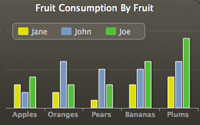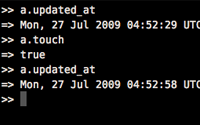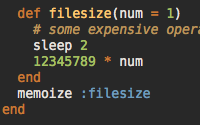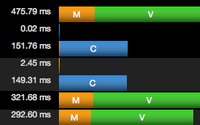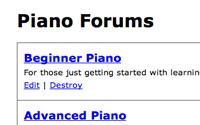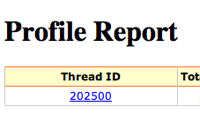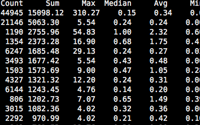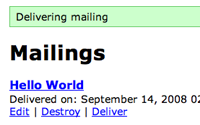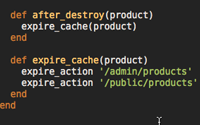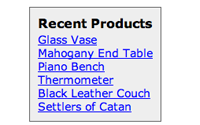Categories
- Active Record
- Active Resource
- Active Support
- Administration
- Ajax
- APIs
- Authentication
- Authorization
- Background Jobs
- Caching
- Code Walkthrough
- Controllers
- Debugging
- Deployment
- eCommerce
- Forms
- Mailing
- Models
- Performance
- Plugins
- Production
- Rack
- Rails 2.0
- Rails 2.1
- Rails 2.2
- Rails 2.3
- Rails 3.0
- Rails 3.1
- Rails 3.2
- Rails 4.0
- Refactoring
- Routing
- Search
- Security
- Testing
- Tools
- Views
Charts
There are a number of libraries to help create graphs. Here I show how to integrate Highcharts into a Rails app.
(16 minutes)
Touch and Cache
Rails 2.3.3 brings us a new feature called "touch". See how to use this to auto-expire associated caches in this episode.
(6 minutes)
Memoization
Rails 2.2 is out! In this episode I show how to upgrade Rails and then demonstrate one of the new additions: Memoization.
(5 minutes)
Three Profiling Tools
Ever want to know what Rails is doing under the hood during a request? In this episode I show three different profiling tools: New Relic RPM, FiveRuns TuneUp, and Rack::Bug.
(7 minutes)
Dynamic Page Caching
Use JavaScript to allow dynamic content in a page cache. In this episode I show you how to insert the user-specific content into a page through JavaScript.
(11 minutes)
Request Profiling
You can use profiling to determine where the performance bottlenecks are in specific Rails actions. Watch this episode for details.
(10 minutes)
Analyzing the Production Log
In order to improve performance of your Rails application you need to find the bottlenecks. A great starting point is your production log. In this episode you will see how to use RAWK to analyze your log file and determine which controller actions take up the most processing time.
(5 minutes)
Rake in Background
In need of a background process? You may be able to accomplish this with a simple Rake task. See how in this episode.
(10 minutes)
Action Caching
Action caching behaves much like page caching except it processes the controller filters. You can also make it conditional as seen in this episode.
(7 minutes)
Fragment Caching
Sometimes you only want to cache a section of a page instead of the entire page. Fragment caching is the answer as shown in this episode.
(6 minutes)

